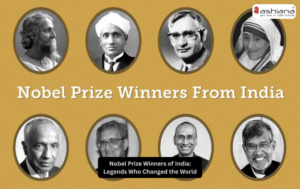
The Nobel Prize stands as one of the greatest global honors, recognizing individuals who have transformed humanity through path-breaking work in peace, literature, science, and economics. Over the years, many Indian Nobel Prize winners have brought glory to the nation by leaving an everlasting impact on the world. These extraordinary personalities have not only revolutionized their respective fields but also inspired generations across borders.
In this article, we’ll explore the remarkable journey of Indian Nobel laureates, their groundbreaking contributions, and the rich legacy they have left behind in the pages of Nobel Prize India history.
Why Indian Nobel Prize Winners Hold a Special Place
The story of Nobel Prize winners in India history is deeply rooted in resilience, creativity, and a quest for knowledge. From freedom fighters advocating peace to scientists reshaping modern research, each of these famous Indian Nobel winners reflects the true potential of human brilliance. Their journeys remind us that with determination and vision, ideas can indeed change the world.
List of Indian Nobel Prize Winners
Here’s the inspiring list of Indian Nobel Prize winners who shaped history and made India proud:
- Rabindranath Tagore (Literature, 1913)
The first Asian Nobel laureate, Tagore’s Gitanjali (Song Offerings) brought Indian literature to global recognition, blending spirituality with humanism. - C. V. Raman (Physics, 1930)
Celebrated for discovering the Raman Effect, his research on light scattering placed Indian science firmly on the world stage. - Har Gobind Khorana (Medicine, 1968)
Born in Raipur, Punjab, Khorana decoded the genetic code and proved how nucleotides determine protein synthesis — paving the way for modern biotechnology. - Mother Teresa (Peace, 1979)
Known worldwide for her compassion, she dedicated her life to serving the poor in Kolkata and became a symbol of humanity and love. - Subrahmanyan Chandrasekhar (Physics, 1983)
Nephew of C. V. Raman, Chandrasekhar received the Nobel for his stellar evolution research, including the famous Chandrasekhar Limit. - Amartya Sen (Economics, 1998)
An economist whose theories on poverty, famine, and welfare economics reshaped development policies globally. - V. S. Naipaul (Literature, 2001)
Though born in Trinidad, his Indian heritage was central to his writings. His works explored themes of colonialism, identity, and migration. - Venkatraman Ramakrishnan (Chemistry, 2009)
Honored for research on ribosomes, his discoveries revolutionized molecular biology and drug development. - Kailash Satyarthi (Peace, 2014)
Founder of Bachpan Bachao Andolan, Satyarthi rescued thousands of children from exploitation and child labor, championing children’s rights worldwide. - Abhijit Banerjee (Economics, 2019)
An MIT professor, Banerjee, with Esther Duflo and Michael Kremer, developed innovative methods to address global poverty and inequality. - Abdus Salam (Physics, 1979) – Shared Roots with India
Born in pre-partition Punjab, Salam contributed to the electroweak unification theory in physics. Though a Pakistani citizen, his birthplace connects him to India’s Nobel history. - Ronald Ross (Medicine, 1902) – Born in India
A British scientist born in Almora, India, Ross discovered how malaria spreads through mosquitoes — a finding that saved countless lives.
The Lasting Legacy of Indian Nobel Laureates
Each of these Indian Nobel Prize winners forged a path that continues to inspire. Collectively, their contributions span literature, science, economics, and humanitarian work. Their impact reaches far beyond accolades, shaping policies, saving lives, and inspiring future generations.
Nurturing Future Nobel Minds: The Role of Home Environments
Behind every famous Indian Nobel winner lies not just talent but an environment that nurtured curiosity and resilience. For today’s children, the right space to grow, learn, and dream big is essential.
This is where Ashiana Amarah in Gurgaon, a Kid-Centric Home project, plays a crucial role. Designed with children’s overall growth in mind, it offers thoughtfully created learning hubs, art zones, reading corners, and safe outdoor play spaces. By blending fun with learning, such environments help raise confident, creative, and future-ready individuals.
Final Thoughts
The list of Indian Nobel Prize winners reflects more than just awards — it represents India’s enduring spirit of excellence and humanity. From Tagore’s poetry to Satyarthi’s activism, every laureate has shown the power of using knowledge and compassion to uplift society.
By celebrating the achievements of Indian Nobel laureates, we not only honor their remarkable contributions but also inspire ourselves to aim higher and create a better world.